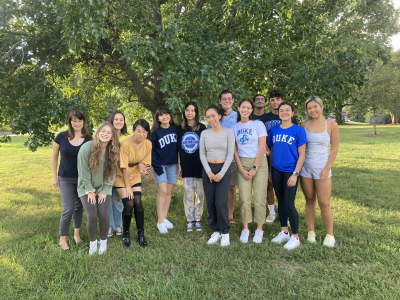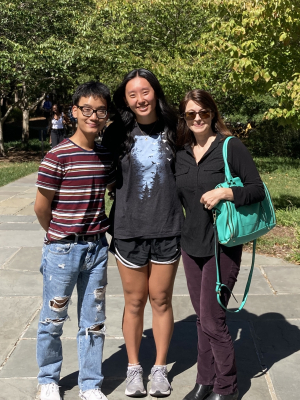Haley Warren, Trinity Communications

Though her office is small, it is filled with the stories of former students.
Printed out copies of journal articles and clippings from graphic novels are pinned to her walls. Essays and collections cover her desk. She proudly points them all out, explaining the research these papers originated from and how excited she is to have them published in various journals.
She looks at one, explaining how the essay’s author writes about the plight of the “no-no boys,” a group of Japanese American men deemed disloyal during World War II. Another is about the narratives of Chinese laundry workers. Mid-conversation, another professor brings by a publication, and she cheerfully flips through to find the latest piece published by her former student.
What do all these have in common? They originated in Lecturing Fellow Susan Thananopavarn’s Writing 101 course.
It’s no wonder Thananopavarn won the Excellence in Teaching Writing Award.

Thananopavarn has been teaching in the Thompson Writing Program for seven years, using its writing-in-the-disciplines approach — which allows first-year students to study writing within specific areas of focus — to combine both her disciplinary expertise with her knowledge of teaching writing. Her Writing 101 course, Asian American Narratives: Literature, History and Activism, introduces students to the writing process through Asian American writing, which many of her students feel personal connections to.
“From a writing perspective,” she says, “It is valuable work in learning how to take projects and information that they really want to research and giving them the tools to be able to research these topics in a scholarly way.”
When Thananopavarn first introduced the idea of her writing section, she didn’t know how much of an appetite there was for a course that focused on Asian American studies. What she found was not only an interest, but one that had been a long time coming.
“I asked around to see whether there would be enough student interest to teach an Asian American studies-themed writing course,” she said. “And what I quickly found out was that there was actually a decades-long student movement at Duke to get an Asian American studies program. So there was a need. And there was a demand.”
The demand was so great for Thananopavarn’s class that her one Writing 101 section cannot accommodate all the interested students.
Even students who don’t intend to continue in the field can benefit from learning about writing through the lens of Asian American narratives. By using the literature and narratives of Asian American people and history, Thananopavarn can teach her students writing techniques while also introducing them to a literary and historical canon that many have not encountered before, from graphic novels like Thi Bui’s The Best We Could Do to critical texts like Hyper Education by current Keohane Visiting Professor Pawan Dhingra.

“It’s difficult as an Asian American to navigate history because so much of our history is rendered invisible or inaccessible to us,” said sophomore Thang Lian, who is majoring in critical refugee studies through Program II and minoring in Asian American & Diaspora Studies. “And therefore, learning about history from the perspective of Asian American writers and literature is enormously important,” Lian said.
“One of the problems I think that students encounter with their high school education is that Asian American experiences are often either a footnote or not mentioned at all,” Thananopavarn explained.
This is the experience described by one of her former students, Carina Lei. Lei shared that there were no course offerings at her high school that focused on Asian American studies. “It was either Asian studies or American studies — like this weird dichotomy,” she said.
Lei arrived at Duke excited to find that she could study this topic within a required first-year course, making the material accessible to her and other students. The course provided her the opportunity to explore parts of her identity that she had not previously been able to in a formalized, academic setting.
“I could see how the readings in the class were directly pertinent to my own history and contextualization of my Asian American identity,” she said. “It was really important for someone like me who wants to understand or is trying to figure out what identity means. And this class is a really key experience for me to get to the bottom of it.”
The Award for Excellence in Teaching Writing honors exceptionally strong teachers of academic writing, but a large part of teaching first-year courses involves connecting with undergraduate students as well. Thananopavarn does exactly this with her students, not only by drawing on underrepresented narratives through her course, but also by helping students see the necessity of sharing their own narratives — and equipping them to do so.
“She led her course in such a way that it feels like what we have to offer has value,” Lian said of his course experience.
As Thananopavarn explains how many Asian American narratives have been erased or inaccessible over time, it is hard to look past the work she is doing to reverse that trend for her students. There are now many new Asian American stories and histories available to future students to read and enjoy, in part thanks to the encouragement, activism and mentoring of Thananopavarn.
While she surrounds herself with these stories, she is also ensuring that future students will feel empowered through their writing to make change.